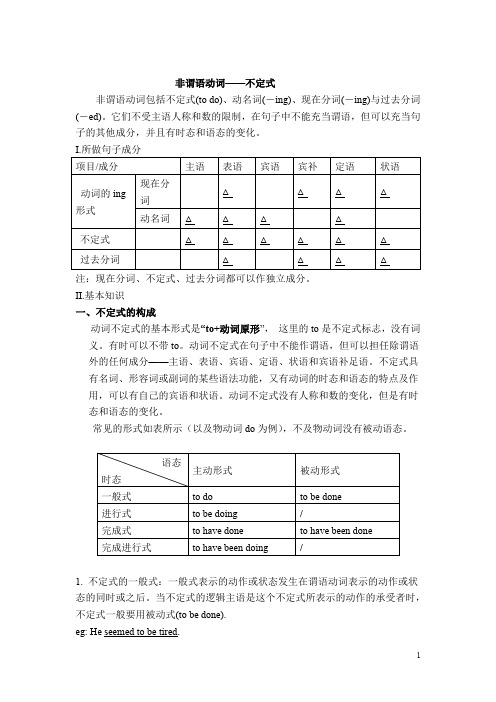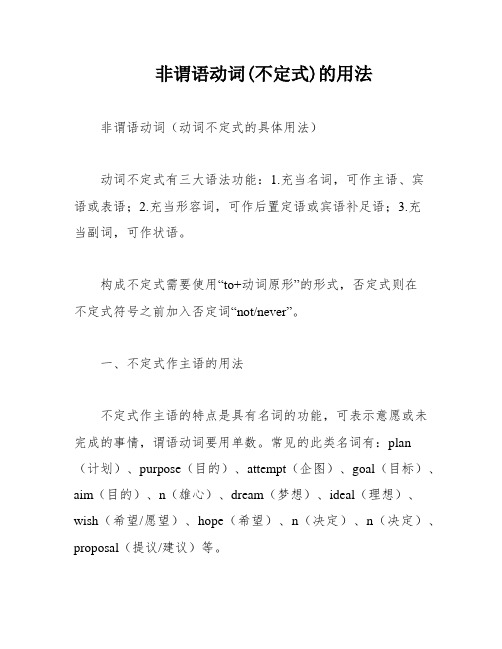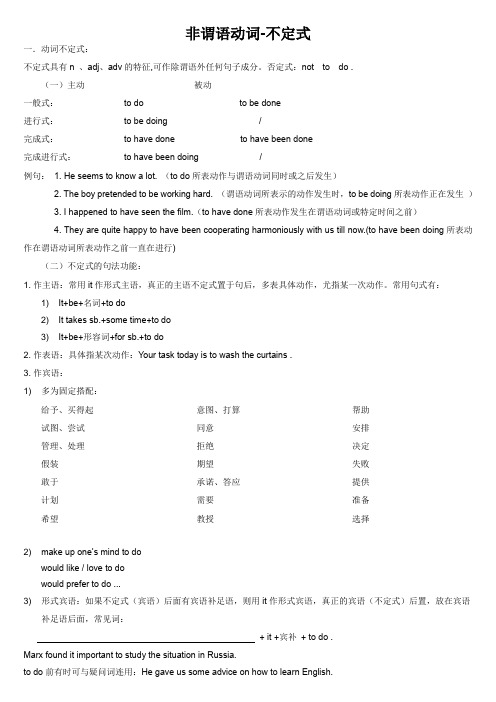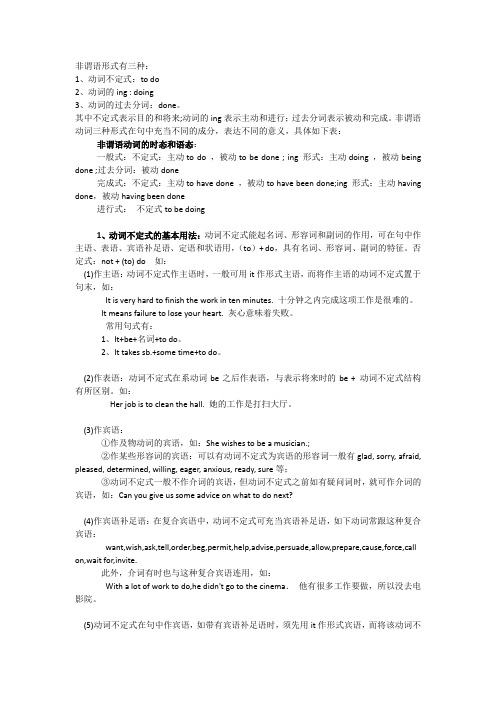非谓语动词不定式
非谓语动词之不定式

非谓语动词:在句子中充当除谓语以外的句子成分的动词形式叫做非谓语动词,也叫作动词的非限定形式。
非谓语动词在句中不可单独做谓语,不受主语人称和数的限制。
它在句中可以用作其他句子成分。
非谓语动词有3种形式:不定式、动名词、分词(包括现在分词和过去分词)不定式的一般式:表示的动作通常与谓语动词的动作同时发生或者在其后发生。
How I wish to travel around the world. 我多么希望能够周游世界。
The shop expects to make a small profit this year. 这家店铺期望今年能够赚点钱。
不定式的进行式:表示动作正在进行,与谓语动词动作同时发生。
Don’t pretend to be working hard. 不要假装努力工作。
不定式的完成式:表示的动作发生在谓语动词动作之前。
I am sorry to have given you so much trouble. 真对不起,给你带来这么多麻烦。
不定式的完成进行式:表示在谓语动词动作之前一直在进行的动作。
Robin is known to have been studying aboard for a while, but we don’t know which country.我们知道罗宾在国外学习了一段时间了,但是不知道在哪个国家。
不定式的被动形式:当动词不定式的逻辑主语是不定式所表示的动作的承受者时,一般要用被动语态。
不定式被动语态的一般式通常表示将来的动作。
All the work required to be completed next week. 所有的工作要求下周完成。
不定式被动语态的完成式表示的动作发生在谓语动词动作之前。
The window glass is supposed to have been broken by Alva. 可能是阿尔瓦打碎了窗户玻璃。
不定式的否定形式:由not或者never加不定式构成。
非谓语动词——不定式

非谓语动词——不定式非谓语动词包括不定式(to do)、动名词(-ing)、现在分词(-ing)与过去分词(-ed)。
它们不受主语人称和数的限制,在句子中不能充当谓语,但可以充当句子的其他成分,并且有时态和语态的变化。
注:现在分词、不定式、过去分词都可以作独立成分。
II.基本知识一、不定式的构成动词不定式的基本形式是“to+动词原形”,这里的to是不定式标志,没有词义。
有时可以不带to。
动词不定式在句子中不能作谓语,但可以担任除谓语外的任何成分——主语、表语、宾语、定语、状语和宾语补足语。
不定式具有名词、形容词或副词的某些语法功能,又有动词的时态和语态的特点及作用,可以有自己的宾语和状语。
动词不定式没有人称和数的变化,但是有时态和语态的变化。
常见的形式如表所示(以及物动词do为例),不及物动词没有被动语态。
1. 不定式的一般式:一般式表示的动作或状态发生在谓语动词表示的动作或状态的同时或之后。
当不定式的逻辑主语是这个不定式所表示的动作的承受者时,不定式一般要用被动式(to be done).eg: He seemed to be tired.The building to be finished next month is for our teachers.2. 不定式的进行式:进行式表示动作正在进行,与谓语的动作同时发生。
e.g. When I went to his home, he happened to be traveling around the world.3. 不定式的完成式:如果不定式所表示的动作或状态发生在谓语动词所表示动作或状态之前,就用完成式;若是在此基础上的被动含义,就用完成被动式( to have been done).e.g. He is said to have written a novel about the Long March.He is said to have been taught French when he was a child.4. 不定式的完成进行式:如果不定式的动作是在谓语所表示的时间之前一直在进行或有可能继续进行的动作,就要用完成进行式.eg. We’re happy to have been working with the experts all the month.二、不定式的用法:1. 动词不定式做主语:不定式做主语一般表示具体的某次动作。
非谓语动词(不定式)的用法

非谓语动词(不定式)的用法非谓语动词(动词不定式的具体用法)动词不定式有三大语法功能:1.充当名词,可作主语、宾语或表语;2.充当形容词,可作后置定语或宾语补足语;3.充当副词,可作状语。
构成不定式需要使用“to+动词原形”的形式,否定式则在不定式符号之前加入否定词“not/never”。
一、不定式作主语的用法不定式作主语的特点是具有名词的功能,可表示意愿或未完成的事情,谓语动词要用单数。
常见的此类名词有:plan(计划)、purpose(目的)、attempt(企图)、goal(目标)、aim(目的)、n(雄心)、dream(梦想)、ideal(理想)、wish(希望/愿望)、hope(希望)、n(决定)、n(决定)、proposal(提议/建议)等。
为了避免主语过长,不定式短语可放在句末,用形式主语“it”代替原来的主语位置,不定式则成为真正的主语。
例如:___.(赢得冠军是我的雄心。
)To master a foreign language is necessary.(掌握一门外语是有必要的。
)To e President of the United States used to be my goal.(过去我的梦想是成为美国总统。
)Speaking perfect English is always my dream.(说一口流利的英语一直是我的梦想。
)It is ___.(保护环境是有必要的。
)There are two special ___:1) It is + adj + of sb + to do sth.2) It is + adj + for sb + to do sth.___ characteristics and differences are:1) If ___ characteristics or traits。
the logical subject of the ___ "of."Examples:It is very affable of you to help me。
非谓语动词-不定式

被动句里,主语补足语要还原to
She is often seen to walk to school by herself. 人们经常看到她独自步行上学。
The workers are made to work extra hours everyday. 工人们被迫每天加班。 但是:
Let the girl try it again.
很抱歉让你久等了。
They seemed to be discussing something important.
他们似乎在讨论一些重要的事情。
作补语
形容词,介词短语,现在分词,过去分词都可以做宾语补足语。 在被动句里,原来的宾语成了主语,补足语就成了主语补足语。 My parents allowed us to play in the stream. 我父母允许我们在小溪里玩耍。 We were not allowed to play in the stream. 我们不能在小溪里玩耍。 We would like you to come to our party. 我们希望你来参加我们的聚会。 I didn't expect there to be so many people in the market. 我没想到市场里会有这么多人。
作定语
不定式在句中作定语,置于被修饰的名词或代词之后。如: The next thing to do is to find a hotel.接下来要做的就是找到一家旅馆。 1. 动宾关系: I have a meeting to attend. 2. 主谓关系: (be the first/second/last…to do)He is the first one to come. 3. 同位关系(说明所修饰名词的内容)we all have a chance to go to college. 注意:不定式为不及物动词时,所修饰的名词如果是地点、工具等,要有相应的介词 He found a good house to live in. Please give me a pen to write with. 但如果不定式修饰的是time, place, way等就可以省略介词 He has no place to live. Something, anything, nothing, everything等复合不定代词常用不定式作后置定语 Do you have anything to read? 不定式短语作定语是一个难点,请注意不定式和被修饰词之间的关系: (1)表示将来的动作。 (2)与被修饰词之间有动宾关系,如是不及物动词,则需加介词。 (3)与被修饰词之间有动宾关系,同时与句中其它词之间又有逻辑上的主谓关系时,尽管有被动含义,却仍 用主动语态;如 只有动宾关系,而无逻辑上的主谓关系,则需用被动语态。
非谓语动词-不定式

非谓语动词-不定式一.动词不定式:不定式具有n 、adj、adv的特征,可作除谓语外任何句子成分。
否定式:not to do .(一)主动被动一般式:to do to be done进行式:to be doing /完成式:to have done to have been done完成进行式:to have been doing /例句:1. He seems to know a lot. (to do所表动作与谓语动词同时或之后发生)2. The boy pretended to be working hard. (谓语动词所表示的动作发生时,to be doing所表动作正在发生)3. I happened to have seen the film.(to have done所表动作发生在谓语动词或特定时间之前)4. They are quite happy to have been cooperating harmoniously with us till now.(to have been doing所表动作在谓语动词所表动作之前一直在进行)(二)不定式的句法功能:1. 作主语:常用it作形式主语,真正的主语不定式置于句后,多表具体动作,尤指某一次动作。
常用句式有:1) It+be+名词+to do2) It takes sb.+some time+to do3) It+be+形容词+for sb.+to do2. 作表语:具体指某次动作:Your task today is to wash the curtains .3. 作宾语:1) 多为固定搭配:给予、买得起试图、尝试管理、处理假装敢于计划希望意图、打算同意拒绝期望承诺、答应需要教授帮助安排决定失败提供准备选择2) make up one’s mind to dowould like / love to dowould prefer to do ...3) 形式宾语:如果不定式(宾语)后面有宾语补足语,则用it作形式宾语,真正的宾语(不定式)后置,放在宾语补足语后面,常见词:+ it +宾补+ to do .Marx found it important to study the situation in Russia.to do前有时可与疑问词连用:He gave us some advice on how to learn English.4) 句型:过去常做不得不做应该做愿意做准备、愿意做be sure / glad / happy / afraid +to do be sorry / anxious / eager +to do5) 省略to 的句型:为什么不做?不能做只能做最好做宁愿做而不做4. 作补语:1) 在复合宾语中,动词不定式可充当宾语补足语,如下动词常跟这种复合宾语:want wishasktellorder beg permit help advise persuade allowpreparecauseforcecall onwait forinviteencourageexpectforbidgetintendlikelovepreferremindrequireteachwarndepend on此外,介词有时也与这种复合宾语连用,如:With a lot of work to do, he didn't go to the cinema.2) 有些动词如make, let, see, watch, hear, feel, have等与不带有to的不定式连用,但改为被动语态时,不定式要加to (主动省略to 被动还原to):I saw him cross the road.He was seen to cross the road.※五看:三让:二听:一感觉:3) 作主语补足语的句型:said reportedsb + be believed considered + to be doneknown found to have been donesupposed thoughtIt is said that he has gone abroad .= He is said to have gone abroad .He was later discovered to have been a spy.4)thinkconsiderbelievesupposefeel ...+ to be 作宾语补足语或主语补足语findimagineproveappointjudge 例:People considered him to be a great leader .He imagines himself to be an able man .5. 作定语:1) 若不定式所修饰词是不定式的地点、工具,不定式后要有相应介词:He didn’t have a house to live in . 若修饰的词为:time、way、place,不定式后省略介词: He didn’t have place to live .2) 若不定式作定语与所修饰词形成被动关系(动宾关系),可用to do 也可用to be done :Have you got anything to send ? (执行者为句子主语)to be sent ? (执行者是其他人)3) 用不定式作定语的情况:①表将来:The car to be bought is for his sister .②修饰被序数词、最高级或no ,all ,any 限定的中心词且为主动关系:He was the best man to do the job .③用来修饰抽象名词:能力机会主意事实借口承诺答案回复企图信仰方式理由时刻时光☆某些名词的同根词常跟to do ,因而也跟to do ,如:计划提议决定拒绝失败警告焦虑渴望愿望准备就绪例:我没有去观光的机会我不相信他会来访的承诺他没有去那里的计划他没有计划去那里6.作状语:1) 目的状语:He worked day and night to get the money. 若强调目的性,也可加in order to (可在句首)/ so as to(只在句中),此两结构在剧中时,不用都好隔开。
非谓语动词之不定式

动词不定式一.定义1•由“ to+动词原形”构成,是动词的一种非谓语形式,在句中作除谓语之外的其他成分。
to 是不定式的标志,无词义。
不定式无人称和数的变化,2. 肯定形式to do; 否定形式not to do 。
3. 不定式仍有动词的特点,即可以有自己的宾语和状语。
二.功能:不定式有名词、形容词、副词的功能,在句中作主语、宾语、表语、定语、宾语补足语和状语。
就是不作谓语。
1. 作主语(谓语动词使用三单形式) , 一般表示具体的某次动作。
①直接放在句首To help each other is good.②用it 作形式主语,而将作真正的主语(不定式)置于句末,如以下结构:♦It is easy/ hard/ difficult/important/necessary/interesting …(for sb.) to do sth.It is important for us to learn English we l.l♦It is our duty to do sth.It is our duty to keep our classroom clea. n注:-ing形式与不定式作主语之区别:-ing 作主语,通常是某种经常性的活动,即泛指某种抽象的动作;不定式作主语,通常表示某次具体的动作。
2. 作宾语①常只跟to do 作宾语的动词如下:hope, plan, decide, expect, agree, choose, seem, happen, learn, teach, prepare, promise, wish, wait, fail, afford, manage, refuse, pretend, offer, arrange 等②即跟to do又跟-ing作宾语,意义差别不大的有:begin/start; continue;③即跟to do又跟-ing作宾语,且意义差别很大的有:remember, forget, mean, try, regret, stop, can'thelp 等。
英语非谓语动词:不定式,动名词和分词

英语非谓语动词:不定式,动名词和分词非谓语动词分为三种形式:不定式、动名词和分词(包括现在分词和过去分词)(一)动词不定式动词不定式可以作主语、宾语、宾语补足语、定语、状语、表语。
动词不定式由“to+动词原形”构成,否定形式“not to +动词原形”。
1.用法(1)作主语。
往往用it作为形式主语。
如:It is time to get up.(2)作宾语。
如果带有宾语补足语,往往把不定式短语放在宾语补足语之后,用it作形式宾语。
如:I find it interesting to study English.有些动词只能用动词不定式作宾语。
如:decide,plan,desire,hope,wish,promise,ask,agree, manage等。
(3)作宾语补足语A:带to的动词不定式有:ask,tell,want,teach,advise,allow,beg,invite等。
如:He asked me to do the work.B :接不带to的动词不定式有:see,watch,hear,make ,let等。
如:I often see him play football.使役动词不带to,动词有:一感二听三让四观看。
一感:feel 二听:hear, listen to 三让:let,have,make 四观看:observe,see,watch,look at注意:feel, hear,notice, see,watch,have,make等词后的补足语中,不定式不带to,但变成被动结构时,要带to.如:I often hear him cry. He is often heard to cry.注意:带but介词的不定式。
如果介词之前有行为动词do的各种形式,那么but后的不定式不带to,否则要带to。
另外,在can’t choose but...和can’t help but...等后面的不定式也省略to。
英语非谓语

非谓语形式有三种:1、动词不定式:to do2、动词的ing : doing3、动词的过去分词:done。
其中不定式表示目的和将来;动词的ing表示主动和进行;过去分词表示被动和完成。
非谓语动词三种形式在句中充当不同的成分,表达不同的意义,具体如下表:非谓语动词的时态和语态:一般式:不定式:主动to do ,被动to be done ; ing 形式:主动doing ,被动being done ;过去分词:被动done完成式:不定式:主动to have done ,被动to have been done;ing 形式:主动having done,被动having been done进行式:不定式to be doing1、动词不定式的基本用法:动词不定式能起名词、形容词和副词的作用,可在句中作主语、表语、宾语补足语、定语和状语用,(to)+ do,具有名词、形容词、副词的特征。
否定式:not + (to) do 如:(1)作主语:动词不定式作主语时,一般可用it作形式主语,而将作主语的动词不定式置于句末,如:It is very hard to finish the work in ten minutes. 十分钟之内完成这项工作是很难的。
It means failure to lose your heart. 灰心意味着失败。
常用句式有:1、It+be+名词+to do。
2、It takes sb.+some time+to do。
(2)作表语:动词不定式在系动词be之后作表语,与表示将来时的be + 动词不定式结构有所区别。
如:Her job is to clean the hall. 她的工作是打扫大厅。
(3)作宾语:①作及物动词的宾语,如:She wishes to be a musician.;②作某些形容词的宾语:可以有动词不定式为宾语的形容词一般有glad, sorry, afraid, pleased, determined, willing, eager, anxious, ready, sure等;③动词不定式一般不作介词的宾语,但动词不定式之前如有疑问词时,就可作介词的宾语,如:Can you give us some advice on what to do next?(4)作宾语补足语:在复合宾语中,动词不定式可充当宾语补足语,如下动词常跟这种复合宾语:want,wish,ask,tell,order,beg,permit,help,advise,persuade,allow,prepare,cause,force,call on,wait for,invite.此外,介词有时也与这种复合宾语连用,如:With a lot of work to do,he didn't go to the cinema.他有很多工作要做,所以没去电影院。
- 1、下载文档前请自行甄别文档内容的完整性,平台不提供额外的编辑、内容补充、找答案等附加服务。
- 2、"仅部分预览"的文档,不可在线预览部分如存在完整性等问题,可反馈申请退款(可完整预览的文档不适用该条件!)。
- 3、如文档侵犯您的权益,请联系客服反馈,我们会尽快为您处理(人工客服工作时间:9:00-18:30)。
非谓语动词--动词不定式(一)形式:1)I plan to attend the meeting.我计划参加这次会议。
2)I am sorry to have kept you waiting.很抱歉让你久等了。
3)They are said to be working hard.据说他们工作得很努力。
4)He is said to have been working in that factory for twelve years.据说他已在那家工厂工作12年了。
5)These clothes are to be washed as soon as possible.6)He is disappointed not to go swimming this afternoon.(二)用法1. To help each other is good.It is good to help each other_____________________________________________2. My job is to drive them to the power station every day.Our plan is to set up another middle school for the peasants’ children.To see is to believe.______________________________________________3. She wishes to be a musician.I am determined to give up smokingI don’t think it right to do it that way._____________________________________________4. Tell the children to play outside.I saw a little girl run across the street_________________________________5. Have you got anything to eat?But she gave up the chance to go abroad.Who was the last one to leave the classroom last night?Is this the best way to help him?__________________________________6. We went there to see our grandparents.I am very sorry to hear that.She hurried home only to find her father dead.To look at the picture, you would like it._____________________________________(三)句型1. It is very important for us to get everything ready for the harvest.It is very kind of you to help him every day._______________________________________________________________________________________________2.疑问词who,what,which,when,where和how后加不定式结构,它在句中可以用作主语、宾语、表语。
1)When to start has not been decided.何时动身尚未决定。
______2)I don't know what to do.我不知道该怎么办。
_______3)The difficulty was how to cross the river.困难在于如何过河。
______4)I can tell you where to get this book.我可以告诉你哪里可以买到此书。
____3. 1)I couldn't do anything but sleep.___________________2)I did nothing but wait.__________________3)He had nothing to do but cry.__________________4)I had no choice but to sleep.________________________5)They desire nothing but to enjoy the present moment.__________(四)主动形式表达被动意思1. These apples are good to eat. 这些苹果很好吃。
I find the lecture difficult to understand. 我发现这个报告很难懂。
He is a man easy to get on with. 他是一个容易相处的人。
______________________________________________________________2. The passage is too hard to translate. 这一段太难,无法翻译。
______________________________________________________________3. I don't know what to do next. 我不知道下一步该做什么。
______________________________________________________________4. I have a meeting to attend today. 今天我有个会议要参加。
Do you have anything to say? 你有什么话要说吗?He gave me some books to read. 他给了我一些书看。
______________________________________________________________I'm going to Beijing next week. Do you have anything to be taken to your parents? 下周我要去北京,你有什么东西(让我)捎给你父母吗?______________________________________________________________(五) 练习:1. ---- Can you ride a horse?---- No, I never had the chance ____.A. for learning itB. for learning howC. how to learn itD. to learn how2. Paul said, "Give me a chair _____."A. to sitB. sitC. sit onD. to sit on3. I ran too fast ______ where I was going.A. to noticeB. for me to noticeC. to notice for meD. and notice4. ---- Have you enjoyed your visit here? ---- Yes, I'll be very sorry______ .A. for leavingB.of leavingC. to leaveD. with leaving5. ---- I'll help you whenever you need me. ---- Good. I'd like _____me tomorrow.A. you helpingB. that you will helpC. you to helpD. that you help6. ---- I didn't hear you come in last night.---- That's good. We tried_____ noisy.A. not beB. not to beC. to be notD. to not be7. Because of air pollution being greatly reduced, this city is still ______.A. a good place which to be lived inB. lived as a good placeC. a good place to live inD. living in as a good place8. ---- Why was the official meeting called?---- ______ new officers.A. SelectB. SelectingC. To selectD. For selecting9. ---- Where did he go?---- He went to another store ______.A. to buy pencilsB. for buying pencilsC. buy pencilsD. buying pencils10. ---- My baby has a heart trouble.---- Did the doctor find it difficult ______ ?A. in treatingB. treatingC. for treatingD. to treat11. ---- Did the judge ask you many questions?---- Yes, and ______.A. they were difficult to be answeredB. to answer them was to be difficultC. they were difficult to answerD. they had difficulty in answering12. That beggar seems _____ anything yesterday.A. not to have eatenB. not to eatC. didn't eatD. to not have eaten13. The lost child desired nothing but _____ home.A. goB. to goC. going .D. went14.That box is____.A. too heavy for me to carryB. too heavy for me to carry itC. so heavy for me to carryD. very heavy for me to carry15. Would you be ______ to do me a favor, please?A. so kind as .B. too kindC. as kind asD. enough kind16. To learn to speak English well,_____.A. much practice is neededB. one needs much practiceC. much practice is needed by oneD. one is needed much practice17. Tom kept quiet about the accident ______ lose his job.A. so not as toB. so as not toC. so as to notD. not so as to18. Last summer I took a course on ______ .A. how to make dressesB. how dresses be madeC. how to be made dressesD. how dresses to be made19. The house is not large enough ____ .A. to live inB. to be lived inC. to liveD. for living20. Nobody likes ______.A. to speak ill ofB. to be spoken ill ofC. speaking ill ofD. spoken ill of21. I know him ______ a good football player while in college.A. to have beenB. to beC. wasD. had been22. I was surprised______.A. watching him to eat so quicklyB. watch him eat so quicklyC. watching him eat so quicklyD. to watch him eat so quickly23. Mr. White was seen ______ the Palace Museum.A. enterB. to enterC. enteredD. to entering24. I saw Mary ____ the house.A. open the door and go intoB. to open the door and to go intoC. open the door and to go intoD. open the door and went into25. Paul does nothing but _____ all day long.A. playB. to playC. playingD. played26. Now we could not do anything but ______ for him here.A. waitedB. waitingC. to waitD. wait27. I don't know her and I don't ______ .A. wantB. want toC. want itD. to want28. ---- Go to the theatre with me, will you?---- I should like ______, but I don't have time.A. toB. tooC. to doD. to go to29. To play fair is as important as ______.A. to play wellB. play wellC. we play wellD. playing well30. It is the greatest happiness on earth ______.A. loving and to be lovedB. to love and being lovedC. to love and to be lovedD. love and be loved31. _____ is better to love than _____ .A. That, to be lovedB. That, be lovedC. It, be lovedD. It, to be loved32. It's very foolish _____ it?A. for you to sayB. of you to sayC. with you sayingD. in your saying33. It ______ me two hours to find your new house.A. costB. tookC. spentD. used34. We did not expect our offer _____ so quickly.A. rejectedB. to reject .C. to be rejectedD. rejecting35. He told her ______ there at once.A. getB. getsC. should getD. to get36. We all think it most foolish ______ this mistake.A. for you makingB. of you to makeC. you to makeD. for you to make37. I really don't know ____ .A. to swimB. how to swimC. to swim howD. how swim38. ---- What do you think about English? ---- It's a difficult language _____.A. speakingB. to be spokenC. to speakD. Spoken1~5 DDACC 6~10 BCCAD 11~15 CABAA 16~20 BBAAB 21~25 ADBAA 26~30 DBAAC 31~35 DBBCD 36~38 BBCbut 前有do,省to,无do,加to.(1)(动词不定式作主语时,一般可用it 作形式主语,而将作主语的动词不定式置于句末,如:It is good to help each other.(2)作表语:My job is to drive them to the power station every day. 动词不定式在系动词be之后作表语,与表示将来时的be + 动词不定式结构有所区别,如:Our plan is to set up another middle school for the peas ants’ children.我们的计划是给农民子弟再成立一所中学。
